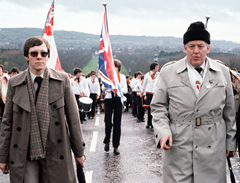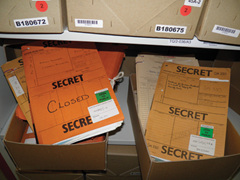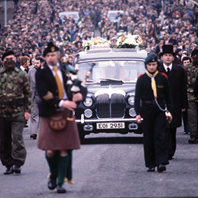Inside Northern Ireland’s 1981 archives
Peter Cheney trawls through the 1981 papers, which depict a province caught in the grip of turmoil. The Troubles took 114 lives that year, including the 10 republican hunger strikers. Today’s political leaders took to the streets and were very much outside the establishment.
A compelling weekly bulletin from the Northern Ireland Office (file NIO/12/194A) describes the first week of May 1981 in grim detail. The medical prognosis of the hunger strikers had a direct bearing on the security situation outside the jail.
“As anticipated in the last bulletin Sands’ condition became critical at the weekend when he lapsed into a coma on Sunday morning [3 May],” it records. “He did not regain consciousness before his death at 01.17 hours early on Tuesday 5, the 66th day of his fast.”
Secretary of State Humphrey Atkins regretted a “needless and pointless death” before adding: “We should not forget the many others who have died.” Atkins urged the people of Northern Ireland to “recognise the futility of violence and turn their faces away from it.” A press statement from republican prisoners blamed the British Government “primarily” for his death but also condemned “politicians and other leading people” for their alleged “timidity and lack of courage”.
The document goes on to report “rioting for most of the day in Belfast” on 4 May and “heavy petrol bombing of RUC targets plus factories, commercial premises and a Methodist church” after Sands’ death. An RUC officer was shot dead in North Belfast on 6 May and an INLA terrorist killed by his own bomb.
A “marked increase in shooting incidents overnight” (6-7 May) suggested that “[IRA] terrorist action will be stepped up to maintain the campaign impetus.”
 Robinson’s prison hostage offer
Robinson’s prison hostage offer
Peter Robinson was prepared to take a government offer to loyalist prisoners holding four prison officers hostage, according to NIO notes (file CENT/1/10/91). The incident happened at Crumlin Road jail and was discussed at a meeting at Stormont Castle starting at 9.15pm on 11 December 1981.
Robinson met NIO Minister of State Adam Butler as part of the Ulster Loyalist Prisoners’ Rights Committee. He warned that “the prison might be burnt down” and said he had been “shouting up to some of the prisoners taking part in the protest and had been told the hostages were being well treated.”
If the committee members could meet the prisoners and take an offer from the Government, he expected that the warders would be released. A Mr McDonald, also on the committee, was “concerned [that] the irresponsible element in the prison would take over completely.”
Butler insisted that third parties could not negotiate with protesting prisoners. “It was a matter for the prison authorities to handle,” as had happened in Great Britain. However, the committee “bore a heavy responsibility if they had the prisoners’ trust and it was essential that they should try to encourage and influence the situation to reduce tension.”
Robinson countered that another NIO Minister, Lord Gowrie, and “all sorts of people” had gone to the Maze to ask the hunger strikers to call off their protest. He warned that if anything happened to the warders, “it would be on the Minister’s conscience.” Ulster Unionist John Carson, a UUP councillor and former North Belfast MP, added: “Protestant feelings were running very high especially when it seemed that Republican prisoners had won all their demands, whilst Loyalist prisoners were being ignored.”
Butler suggested that the committee make an appeal on radio to end the protest, but this was rejected as ineffective. After two and a half hours, both sides agreed that the committee would tell prisoners, through a loud hailer, that they could meet elected representatives if the protest ended; the Government would announce a review of conditions at Crumlin Road for remand prisoners; Lord Gowrie would meet “conforming prisoners” at an early opportunity.
The prison officers were subsequently released.
Frank profiles of political and church figures by NIO staff (file CENT/1/10/36A) indicate their fears that moderate figures were being overshadowed by loud hard line voices.
Ian Paisley “gained his reputation as a fundamentalist preacher with violently anti-catholic views” in the late 1950s and was “far removed from the old traditional middle class unionism”. His majority in North Antrim was “impregnable”.
Catholic Primate Tomás Ó Fiaich was clearly resented: “His public pronouncements tend to gain him notoriety, believing in a phased British withdrawal from the North. He rejects violence, but has on occasion been far from helpful on the prisons issue.” The main Protestant church leaders, all seen as ecumenical, were viewed much more positively.
John Hume had been “an effective Minister of Commerce” and is described as: “Altogether an academically minded, moderate politician.” Jim Molyneaux is curiously listed third out of the four main political leaders, perhaps reflecting NIO frustration: “Rather lacking in populist appeal, his lack of flair may have contributed to the UUP’s steady loss of support to the DUP.”
The DUP had narrowly overtaken the UUP, in first preferences, at the local elections on 20 May (26.57 per cent to 26.56 per cent), more than doubling its vote from 12.7 per cent in 1977. “Not a charismatic man, but an effective leader” was the summary for Alliance’s Oliver Napier.
In economic terms, Northern Ireland was a “uniquely distressed region of the UK” with “exceptionally high unemployment” (17.6 per cent and 101,522 persons in May 1981) and a “high degree of dependence on declining staple industries”. Several factories were at risk of closure, according to official predictions, and the futures of “Shorts and especially Harland and Wolff are not assured in the longer term.”
‘Catholic support’ for shared college
Many Catholic teachers supported a shared teaching training centre, but feared speaking out “because it might harm their job prospects.” The claim was made by Mr Mallaghan from All Children Together (a pro-integrated education group) when it met Education Minister Lord Elton on 26 February 1981.
The interim Chilver report, in June 1980, called for a Belfast Centre for Teacher Education, which would include a Catholic college, Stranmillis College and Queen’s University’s School of Education on the Stranmillis site. According to the official note (file ED/13/2/544), Mr Mallaghan “suggested that the Roman Catholic Church had orchestrated a response to the report and that many people were not aware of what was in it.”
The Minister was sceptical about public demand as he had received “no such approaches” from members of the public. Lagan College was opened in September 1981 as the first formally integrated school, with 28 pupils. That said, several schools had educated Protestants and Catholics together earlier in Northern Ireland’s history e.g. the mill schools of County Down.
 Hunger strike support assessed
Hunger strike support assessed
The hunger strike had generated “substantial international interest, notably in the US, the Holy See and Western Europe” (file CENT/1/10/36A). The UK had “encountered no difficulties from allied governments over the hunger strike, although it remains to be seen whether President [Mitterrand] will succumb to left wing pressure in France.” Mitterrand’s government included ministers from the French Communist Party.
May was a turbulent time in Europe. Bobby Sands’ death (5 May) was followed by the assassination attempt on Pope John Paul II (13 May) which, the NIO surmised, “has probably had the indirect effect of reducing sympathy abroad for terrorist prisoners in Northern Ireland.” However, officials expected interest to revive when the European Commission of Human Rights (a legal tribunal) declared two complaints by prisoners to be admissible.
Some US television coverage had been “unhelpful” but there had been “some attempt at balance” in recent days. The southern Irish and French media were “notably hostile”.
The Taoiseach (at that time Charles Haughey) had urged the British Government to be “flexible on prison conditions” but was also “careful not to associate himself with the prisoners’ demands for political status.” The briefing warned that “Provisional Sinn Féin sympathisers” could take six seats in the Irish general election, which was held on 11 June. Two Anti H-Block candidates were subsequently elected (hunger striker Kieran Doherty and fellow prisoner Paddy Agnew). Haughey was unable to form a government and was succeeded by Garret FitzGerald. Doherty died on 2 August 1981.
In the USA, dockworkers announced a 24-hour boycott of British ships entering US ports on 7-8 May and Irish bars in New York were closed for two hours as a mark of respect (file NIO/12/194A). The East German Communists described Northern Ireland citizens as “suppressed and subject to discrimination”. Anti-British pickets and arson attacks were reported in several countries.







